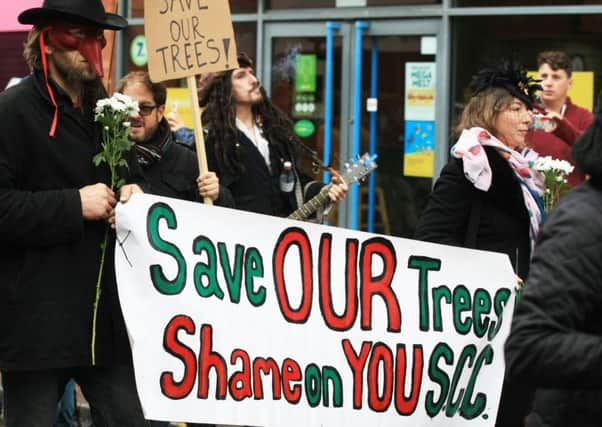Matthew Flinders: Tree saga lays bare roots of distrust in local politics


Political science is dominated by concerns regarding the ‘end’, ‘death’ or ‘suicide’ of democracy and books that highlight the rise of anti-political sentiment and ‘disaffected democrats’. The crisis narratives are arguably now so ubiquitous, and levels of political trust amongst large sections of the public so low, that they no longer tend to provoke shock, or even concern. Crisis, it would appear, is the new normal.
But in Sheffield a very abnormal political crisis appears to be unfolding. Abnormal because no one can really understand why the situation has been allowed to occur, but what is clear is that local confidence in local politics has been shaken to its very roots.
Advertisement
Hide AdAdvertisement
Hide AdThis is a storm that is currently raging in what was once a proud civic city, a steel city, and a green city, but has recently become something of an international laughing stock in terms of local governance. From healthy street tree stock to political laughing stock….
The story?
In 2012 the Labour-ruled council signed a 25-year Private Finance Initiative with a private company called Amey for pavement and street maintenance worth £2.2bn. This contract was supposed to put Sheffield ‘Streets Ahead’ when it came to paths, pavements, and roads, but quickly degenerated into chaos and blame games as Amey implemented a rather draconian approach to tree care.
Put very simply, where a mature street tree has required some form of maintenance or the street or pavement has required even the most minimal and perfectly common re-engineering, Amey has come along and chopped it down. Local communities have understandably protested against this approach but councillors blame the ruling Labour group, and the Labour group blames the PFI contract.
But still what Michael Gove, the Secretary of State for the Environment, described as ‘environmental hooliganism’ has continued. So far nearly 6,000 trees have been felled in the city and a recent Freedom of Information request has revealed that under the contract up to a further 17,500 could fall.
Advertisement
Hide AdAdvertisement
Hide AdIf the use of dawn raids and the arrest of OAPs in order to fell perfectly healthy trees was not enough – a situation the local MP and former Deputy Prime Minister Nick Clegg said was like something from Putin’s Russia – burly private security guards now protect Amey’s tree surgeons (and are themselves surrounded by legions of police officers who I am sure have better things to be doing with their time).
From Green City to Stump City in the shake of a chainsaw.
Now let me get three things straight. I am not a tree hugger and have no history in environmental campaigning. I am not a member of a political party and have no partisan affiliations. Local politics generally bores me rigid.
However, with that all out in the open. I have to admit that, as a political scientist, the Sheffield Street Tree scandal – and it is a political scandal – is by some way the most interesting, revealing, and worrying political saga I have studied in over 20 years.
Everyone is ‘up in arms’ – local communities, the Police and Crime Commissioner, South Yorkshire Police, the national Labour Party – all for being dragged into a very public dispute that never needed to happen. Correction: Sheffield City Council claims it does need to happen because re-negotiation of the PFI contract would be too expensive.
Advertisement
Hide AdAdvertisement
Hide AdBut having studied the Sheffield Street Trees saga through a mixture of participant observation, ethnographic methods, interviews and documentary analysis over the last 12 months, what is most interesting is the manner in which the focus of the protesters has evolved.
As many ‘active citizens’ have told me ‘It’s not about the trees’. It was, but it is now about the failure of local democracy more broadly and particularly about what is perceived to be a disconnected and disinterested local political elite that treats the city as a fiefdom. The silver lining is that the controversy has mobilised the public, it has spurred civic engagement and activity in ways that would not have happened without the chainsaws and security specialists.
The Sheffield Tree Action Groups now contain more than 10,000 members, crowd funding has raised money to pay for legal reviews, festivals, and events have been held to raise awareness, beer has been brewed and the public pressure and media interest shows no sign of relenting. From small acorns mighty oaks will grow.
Matthew Flinders will discuss the politics of Sheffield’s Street Trees with Jarvis Cocker outside Sheffield City Hall on Saturday, April 7.
Advertisement
Hide AdAdvertisement
Hide AdMatthew Flinders is Professor of Politics at the University of Sheffield and is President of the Political Studies Association of the United Kingdom. He is the author of Defending Politics: Why Democracy Matters in the 21st Century.